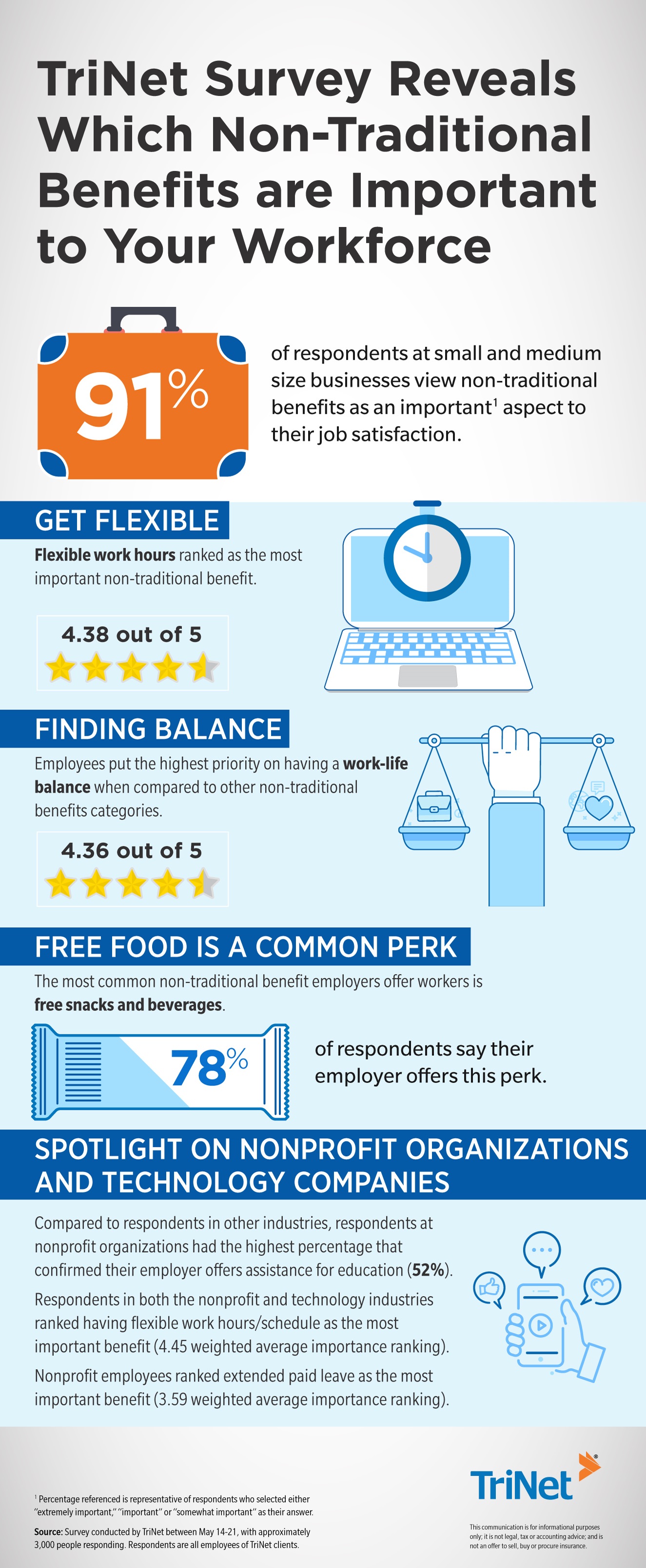
Table of contents
- 1.Download your eGuide.
- 2.Key findings from Non-traditional benefits survey:
Unemployment is the lowest it’s been in 17 years, which means the competition for top talent can be stiff for employers. It’s no surprise that a strong compensation package—including benefits such as healthcare, retirement and flexible/health savings accounts—is critical to a successful recruitment strategy. However, in a tight job market, non-traditional benefits are becoming increasingly popular.
Examples of non-traditional benefits include allowing employees to bring pets to work, offering free snacks and catered meals, gym stipends, childcare benefits, unlimited paid time off, remote work options and more.
Recently, TriNet released a survey[1] that found 91% of respondents at small and medium size businesses view non-traditional benefits as an important[2] aspect of their job satisfaction.
“With low unemployment and more jobs available than job seekers, it is an important time for companies to re-evaluate their incentive and benefit offerings to recruit and retain employees,” said Catherine Wragg, senior vice president of Human Resources at TriNet. “TriNet’s survey results highlight the importance of non-traditional benefits. It is no longer just about compensation, as employees also view time spent with family and friends—and pursuing other aspects of their life—as highly significant.” Wragg added, “Non-traditional benefits can help employers stand out by offering uncommon perks that can be meaningful to employees, positively impact company culture, and potentially help retain top talent.”

Download your eGuide.
Get our eGuide, Winning the War on Talent: Tips for Attracting and Retaining the Best, to learn how to keep top talent that will take your business to the next level.
Key findings from Non-traditional benefits survey:
Non-traditional benefits help bring positive impact
Survey participants said that providing non-traditional benefits improves employee morale (85%), employee retention (82%) and company culture (73%)[3].
Benefits needs can vary by age
Across the board, survey respondents between the ages of 25-34 care most about non-traditional benefits. The age range least interested in non-traditional benefits is employees who are 65 and older, with 25% of respondents in that age bracket indicating that non-traditional benefits are not important.
Employees want flexibility
Flexible work hours/schedule is the most important non-traditional benefit (4.38 weighted average importance ranking) when compared to commuter benefits, unlimited paid time off, paid volunteer time, remote work options, extended paid leave options or paid company shut downs during major holidays.
Food and pets at work are popular offerings
The top non-traditional benefit for work-life balance that employers currently offer their employees is free snacks and beverages (in addition to water and coffee), with 78% of respondents saying their employer offers this perk. More than half of respondents (52%) said their company provides catered lunches. Additionally, almost one third (31%) are allowed to bring their pet to work.
Spotlight on nonprofit organizations and technology companies
Compared to respondents in other industries (life sciences, financial services, professional services, and local and owner-operated businesses), respondents at nonprofit organizations had the highest percentage (52%) that confirmed that their employer offers assistance for education. Additionally, nonprofit employees ranked extended paid leave (3.59 weighted average importance ranking) as the most important benefit in this list.
Respondents in both the nonprofit and technology industries ranked having flexible work hours/schedule (4.45 weighted average importance ranking) as the most important benefit when compared to unlimited paid time off, paid volunteer time, remote work options, extended paid leave options and/or sabbaticals, and paid company shut-downs during major holidays.
Traditional benefits still matter
The traditional benefits that matter most to respondents include healthcare benefits and vacation pay/paid time off/paid sick days (with both categories receiving a weighted average importance ranking of 4.73) when compared to retirement plans/401(K)/pension, performance bonuses, flexible spending accounts (FSA) and health savings accounts.
Contact TriNet to learn more about putting together an employee benefits package to help your business succeed.
This communication is for informational purposes only; it is not legal, tax or accounting advice; and is not an offer to sell, buy or procure insurance.

[1] Survey conducted by TriNet between May 14-21, with approximately 3,000 people responding. Respondents are all employees of TriNet clients.
[2] Percentage referenced is representative of respondents who selected either “extremely important,” “important” or “somewhat important” as their answer.
[3] Survey respondent selected more than one answer as their response.
Table of contents
- 1.Download your eGuide.
- 2.Key findings from Non-traditional benefits survey:





